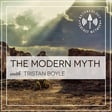
Archaeology in Germany with Michaela Schauer - Ep 13
Archaeology around the world may be different but the different ways in which countries operate may surprise you in their similarities, particularly when it comes to the things that could be better.
Today's episode I sit down with Michaela Schauer who was one of the founding members of CIfA Deutschland. As a relatively new organization in Germany, CIfA Deutschland used the blueprint laid out by Chartered Institute for Archaeologists in the UK and adapted it to what was needed in Germany. We discuss the challenges of getting people on board and how getting involved is a way of things changing and improving.There was recently a survey of archaeologists in Germany, including students and companies to report wages, conditions.
One of their findings was that there are not enough archaeologists in Germany.There are a number of other organizations including DGUF (Deutsche Gesellschaft fur Ur und Fruhgeschicte) which hertiage professionals can be part of, but CIfA aims to provide a broad coalition from all areas and subjects of study. Michaela tells me about her work on pottery and the chemical analysis that can be done to determine how they used and shine a light on early populations that lived on European continent.
Siegmund, F., Scherzler D. (2018). Einführung in die DGUF-Tagung am 4. Juli 2017 in Mainz. „Ein Berufsverband für die Archäologie?“, Archäologische Informationen 41, 15-20. - https://journals.ub.uni-heidelberg.de/index.php/arch-inf/article/view/56913/48292
Schauer, M. (2018). Bericht über das Online-Forum "DGUF-Vortagung 2017 – Ein Berufsverband für die Archäologie?", 6. März bis 9. Juni 2017, Archäologische Informationen 41, 31-54. - https://journals.ub.uni-heidelberg.de/index.php/arch-inf/article/view/56915/48294
Scherzler, D., Schauer, M., Hesse, S., Rauhaus, J., Rind, M. M., Deutscher, L. (2018). Ein Berufsverband für die Archäologie? Zusammenfassung der Debatten beim World Café auf der DGUF-Tagung am 4. Juli 2017 in Mainz, Archäologische Informationen 41, 99-108. - https://journals.ub.uni-heidelberg.de/index.php/arch-inf/article/view/56936/48301
These links refere to the online-conference and conference we did on the question of Germany needs an professional association. In our talk yesterday I mentioned the second which is a report about the online-conferenc and mentiones how CIfA got involved in Germany.
Siegmund, F., Scherzler D. (2019). Die derzeitige Wirtschaftslage in der privatwirtschaftlichen Archäologie Deutschlands – DGUF-Monitoring-Report privatwirtschaftliche Archäologie 2019. Archäologische Informationen 42, 78-98. - https://journals.ub.uni-heidelberg.de/index.php/arch-inf/article/view/69349/62687
Siegmund, F., Scherzler D. & Schauer, M. (2020). DGUF-Umfrage "Evaluation Beruf Archäologie", 10. 6. 2019 - 31. 10. 2019: Durchführung und Teilnehmer der Umfrage (EvaBA 1). DGUF-Preprint, online publiziert 23. März 2020. - https://www.dguf.de/fileadmin/user_upload/EvaBA/DGUF-Dok_Preprint_EvaBA_1_Durchfuehrung-u-Teilnehmer.pdf
Siegmund, F., Schauer, M. & Scherzler D. (2020). Löhne und Gehälter in der deutschen Archäologie – Auswertung der DGUF-Umfrage "Evaluation Beruf Archäologie", 10. 6. 2019 - 31. 10. 2019 (EvaBA 2). DGUF-Preprint, online publiziert 28. Mai 2020. - https://www.dguf.de/fileadmin/user_upload/EvaBA/DGUF-Dok_Preprint_EvaB
